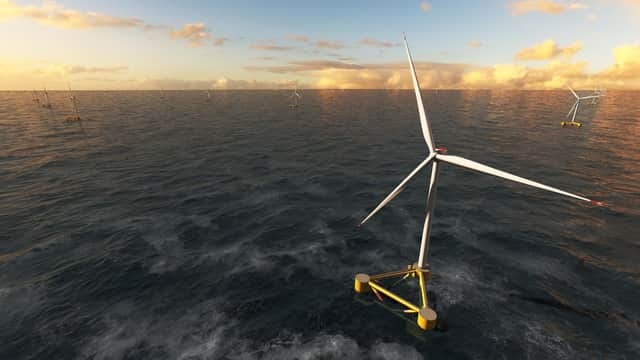Scotland needs to harness its talent to fuel the switch to green jobs - Sian Lloyd-Rees


As the move away from fossil fuels speeds up, as agreed at COP26, there is widespread agreement that this must include both a ‘just transition’ for the communities affected and those working in industries undergoing transition.
This is particularly relevant for oil and gas workers, but there is also a wealth of broad talent in Scotland we need to attract into an exciting, growing industry.
Advertisement
Hide AdAdvertisement
Hide AdSo how do we capture the expertise we already have and marry it with talent from multiple sources, working together to ensure Scotland leads the way in not only delivering renewable energy but also ensuring a just transition?
Speaking at the recent Scotsman Green Skills Conference, I outlined how at Aker Offshore Wind we are focusing on some key areas to get the balance right to successfully deliver offshore wind energy at scale.
Around 80 per cent of the world’s wind resources are in waters deeper than 60 metres and are unsuitable for fixed foundations.
That’s why accelerating floating offshore wind is of such significant importance as a renewable energy technology that will enable us to deliver the scale we need, further from our shores. It’s an area at Aker Offshore Wind we are very familiar with, as the largest shareholder in Principle Power Inc, which in turn, over the past decade, has developed and deployed what is the only bankable and proven semi-submersible technology for floating wind today, the ‘WindFloat’.
We know that floating units further offshore than we have deployed today could be supporting ever larger turbines and will need nuanced foundation platform design, with more subsea cabling, moorings, and remote operations as scale grows and number of units increases rapidly.
Solutions to similar challenges have been developed and optimised for decades in the oil and gas industry where floating technology has been in operation for over 40 years. We need these skills and knowledge if we are to succeed in developing deep-water wind developments at the scale and pace needed to ensure affordability for the consumer. Scotland is home to many of the 160,000 people employed in oil and gas here in the UK, a mature industry with ever fewer opportunities, so we must engage early and support the workforce to transition their skills.
Aker have been instrumental in delivering over 60 per cent of semi-submersible units currently in operation globally. We have been accessing the skill sets of the same people who designed and delivered these earlier floating units for our current wind opportunities for some years now – it’s a relatively straightforward switch in many cases.
I spent two weeks at the COP26 climate conference, and it certainly re-enforced my view on the value of diversity. I attended the IPCC (Intergovernmental Panel on Climate Change) seminar with scientists from around the EU sharing how they pooled their valuable thoughts and research to accelerate introduction of a vaccine for the Covid-19 pandemic.
Advertisement
Hide AdAdvertisement
Hide AdI also listened to many other presenters sharing their experiences on the effects of the climate crisis in their countries today, many from some of the poorer, least developed countries. Despite this they are still managing to fund climate control projects in their communities, and it was interesting to note that women played a major part in driving these projects forward. Their energised leadership was further evidence that diversity drives excellence.
And we know there is a need for many more people going forward, as we create a new industry and gain first mover advantage in Scotland for certain aspects of renewables.
For example, our multiple floating offshore wind bids together with Ocean Winds in the ScotWind leasing round each involve generating up to 5,000 jobs and in total up to 6GW of capacity.
As we seek to fill these vacancies our focus needs to be on attracting people from multiple industries and backgrounds to get the benefit of fresh thinking and new approaches.
The skills learned in the Armed Forces can offer significant benefit, for example – and we are proud to be signatories to the Armed Forces Covenant. The rigorous training of their people in meta skills alone is impressive. Self-reliance, communication, teamwork, creativity and financial accountability are sought after skills, and I’m fortunate to have people who have gained these skills from their previous employment with the Armed Forces in my team.
There will be many examples others can think of, but the underlying goal must be to marry the established skills and capability we have with a broader diversity of experience and expertise.
Finally, we need to encourage the next generation of talent into the renewables industry, providing the opportunities, training and career paths.
Our ScotWind bids each include 200 apprenticeships and/or graduate positions, but we need young talent in multiple roles.
Advertisement
Hide AdAdvertisement
Hide AdIn my experience, attracting talent into an industry is not as challenging as retaining that talent and so we need to develop, discuss and implement career paths which satisfy and resonate with an individual’s needs, ambition and development paths.
This is already recognised by the Scottish Government and Skills Development Scotland.
It was interesting to note the high numbers of young people attending COP26 and actively contributing at the varied sessions. Proof if needed that addressing the climate crisis, of which Renewables plays a significant part, is an attractive career opportunity.
The coming years will see a transformation in the energy industry in Scotland and at Aker Offshore Wind we want to support a transformation in how we access, develop, and retain the diverse workforce needed to deliver a greener future.
-Sian Lloyd-Rees is Managing Director of Aker Offshore Wind UK
Comments
Want to join the conversation? Please or to comment on this article.
